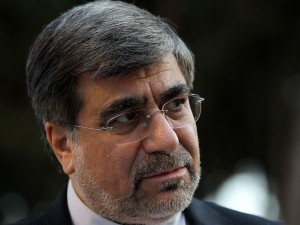 In what is widely seen as a high-level official�s latest criticism of Iran�s unpopular � and largely ignored � bans on information technology, Iranian Culture Minister Ali Jannati told the state news agency this week that more than 70 percent of people in the capital, Tehran, are watching banned satellite channels.
In what is widely seen as a high-level official�s latest criticism of Iran�s unpopular � and largely ignored � bans on information technology, Iranian Culture Minister Ali Jannati told the state news agency this week that more than 70 percent of people in the capital, Tehran, are watching banned satellite channels.Jannati, who in October�came out against Iran�s easily-circumvented ban on Facebook and Twitter, offered a comparison with the country�s prohibition of video cassettes in the eighties � a regulation he called �ridiculous.�
�Maybe in five years we will laugh at today�s actions,� Jannati told state news agency IRNA in the interview.
Since the ascendance of moderate Hassan Rouhani, who�unseated hard-liner Mahmoud Ahmedinejad�in the June presidential election, hopes have risen in Iran that oppressive bans could soon be lifted. Government plans to launch a �halal� intranet, which would have totally isolated Iranian Internet users from the outside world, seem to have waned somewhat. The word halal signifies something that is permitted under Islam, and the term is usually used to describe food.
Rouhani,�with his 153,000 Twitter followers, has also flouted the social media bans, which were instituted after social media were widely used to foment unrest in the aftermath of the disputed 2009 presidential election � the �Twitter Revolution,� it was termed.
�My efforts geared 2 ensure my ppl�ll comfortably b able 2 access all info globally as is their #right,� Rouhani said in a tweet to Twitter founder Jack Dorsey, who had confronted Rouhani with a question about whether Iranians could read their president�s tweets.
But that statement contradicts Iran's policy of jamming satellite TV broadcasts, which has been happening since 2003 and was ramped up after the 2009 elections. Foreign media outlets who may cast Iran in a negative light, including Voice of America and BBC Persian services, report frequent jamming.
�Jamming broadcast signals is a threat to the vital flow of free information,� said a statement issued earlier this year by Peter Horrocks, Director of the BBC World Service. Horrocks said �intensive jamming� of BBC Persian television coupled with harassment of BBC journalists and their families had made for an even more hostile reporting environment in post-election Iran.
The head of Iran�s National Security Forces has gone so far as to call VOA and BBC �the intelligence arms of America and the CIA.�
Subject matter considered �immoral� to the Islamic Republic is also frequently censored, sometimes by jamming a station�s signal.
A broadcast of the World Cup draw ceremony earlier this month cut every shot of model-host Fernanda Lima, whose low-cut dress did not comply with state TV�s broadcasting guidelines.
Combatting 'enemies of Islam'
But even as satellite dishes are legally prohibited � the government occasionally raids homes to confiscate the antennas � many Iranians still have home access to a satellite dish, and more than one-third watch satellite TV weekly, according to conservative estimates by the U.S. Broadcasting Board of Governors.
A report from advocacy groupSmall Media�in 2012 identified 120 Persian-language satellite channels that are beamed into Iran from abroad.
Though Jannati has not explicitly condoned illicit TV-watching, he did note that jamming these channels is less and less practical given the technological advances � in particular the availability of many channels on mobile phones.
But any decision to abolish the satellite ban would have to go through the Islamic Republic of Iran Broadcasting (IRIB), which�defends its censorship of �Western media��� without making reference to satellite jamming � on its website:
�With domineering empire of Western Media aiming for the cultural conversion of the independent nations specifically focusing on the Islamic Republic of Iran, IRIB should play its key role in strengthening the country's cultural solidarity as well as stressing National identity together with fighting against the destructive waves more than before.�
And the IRIB falls under the jurisdiction of the hardline supreme leader, Ayatollah Khamenei, who is a vocal proponent of media censorship and has called the IRIB �the mouthpiece of the Islamic system."
Censorship is necessary, he has said, to combat �a well-organized and obvious offensive which has been launched by enemies of Islam against divine principles with an aim of promoting secularism, undisciplined behavior and corruption among the people.�
By Al Jazeera
The Iran Project is not responsible for the content of quoted articles










